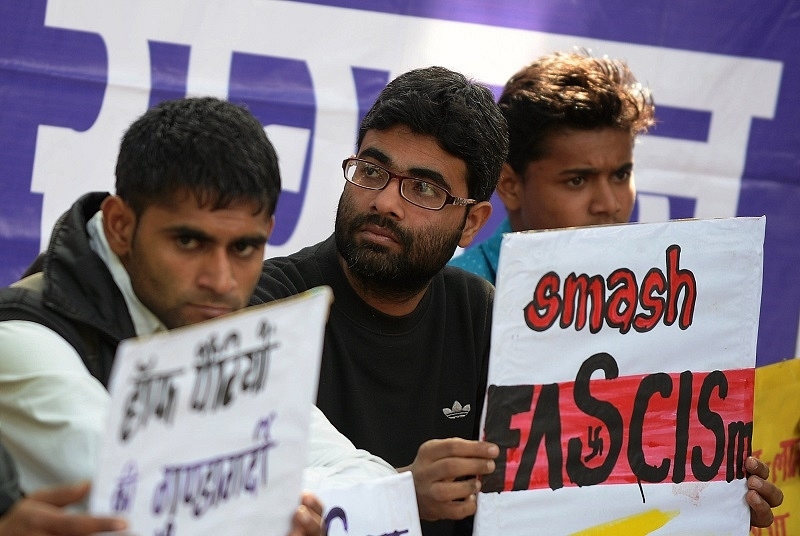Politics
JNU Strike Will Encourage Chaos In India, Students And Teachers Should Respect Law
- A high-level JNU committee has recommended the rustication of JNU Students’ Union president Kanhaiyya Kumar, along with Umar Khaled, Anirban Bhattacharya and two other students for their role in an Afzal Guru event on campus
- Under ‘rustication’ the law is enforced for short periods of time, sometimes a month or even a semester. While the student cannot participate in any academics in that period, s/he is free to return at the end of that period

Student Activists
India will be on streets and chaos will rule the country if all the law-breakers’ families take out morcha like the students of JNU.
The students and teachers of Jawaharlal Nehru University, are scheduled to take out a march from Jantar Mantar to Parliament at 2 pm today (Tuesday, 15, March) to protest the arrests of Umar Khaled and Anirban Bhattacharya, as well as to demand the dropping of sedition charges against the students.
JNU is back in the news again, this time for the reported rustication of as many as five students.
Late Monday night, reports said a high-level JNU committee has recommended the rustication of JNU Students’ Union president Kanhaiyya Kumar, along with Umar Khaled, Anirban Bhattacharya and two other students for their role in an Afzal Guru event on campus at which anti-India slogans were allegedly raised. According to a newspaper, only Khaled and Bhattacharya have been named for rustication, while the others, including Kumar, may merely face a fine.
Under ‘rustication’ the law is enforced for short periods of time, sometimes a month or even a semester. While the student cannot participate in any academics in that period, the student is free to return at the end of that period. A student may be rusticated on disciplinary grounds, for a procedural lapse or public disorder.
This kind of punishment should not be confused with expulsion. Expulsion is a far more serious matter. Under-performing students are not allowed to re-register for the next semester, and effectively cease to be students.
The details of the rustication order are still not public but this is a non-binding recommendation. The committee’s report will now go to Vice Chancellor M Jagadesh Kumar and Chief Proctor A Dimri for a final decision.
Khaled and Bhattacharya are still in jail for allegedly organising a campus event on February 9 at which some activists are said to have raised slogans calling on India to leave Kashmir as well as for the breakup of the country.
Subsequently, Kumar was arrested on charges of sedition, a move by Delhi Police that escalated the issue from an internal JNU matter to a national row.
But why are the students and teachers insisting on going public strike in protest against the arrests of Khaled and Bhattacharya, as well as to demand the dropping of sedition charges against the students. Like other undertrial prisoners and their families, JNU students should fight it out in court of law and avoid public demonstrations.
Meanwhile, the students have asked for making the report public. “Disclose the evidence based on which action has been recommended,” said Ajay Patnaik, the chief of the faculty association at JNU or Jawaharlal Nehru University.
Students who have received the university’s show cause notice have also asked for the report to be made public.“The notice is very vague. It doesn’t say what we have done. It asks us to clarify, but what should we clarify?” questioned one of the students, Anand Prakash.
Support Swarajya's 50 Ground Reports Project & Sponsor A Story
Every general election Swarajya does a 50 ground reports project.
Aimed only at serious readers and those who appreciate the nuances of political undercurrents, the project provides a sense of India's electoral landscape. As you know, these reports are produced after considerable investment of travel, time and effort on the ground.
This time too we've kicked off the project in style and have covered over 30 constituencies already. If you're someone who appreciates such work and have enjoyed our coverage please consider sponsoring a ground report for just Rs 2999 to Rs 19,999 - it goes a long way in helping us produce more quality reportage.
You can also back this project by becoming a subscriber for as little as Rs 999 - so do click on this links and choose a plan that suits you and back us.
Click below to contribute.
Latest